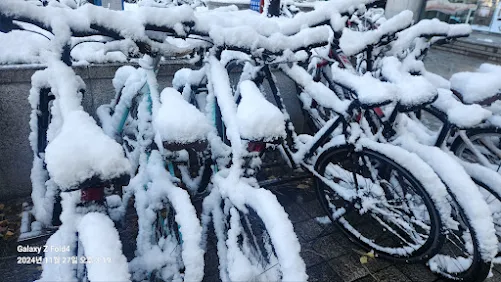Snow in Korea: A Winter Wonderland
Winter in Korea transforms the country into a fairytale-like landscape covered in pristine snow. For visitors from warmer climates, experiencing the first snowfall in Korea can be an unforgettable memory. From December to February, various regions in Korea are blanketed with snow, offering visitors breathtaking winter scenery, exciting seasonal activities, and a cultural connection to snow.
1. Where to See Snow in Korea
Snow falls in Korea mainly from December to February, with January being the coldest month. While Seoul and central regions receive moderate snowfall, Gangwon Province is the snowiest area. Cities like Pyeongchang and Taebaek are famous for their beautiful winter landscapes. Meanwhile, in Jeju Island, occasional snowfall creates a rare sight where volcanic terrain meets snowy fields. However, Seoul does not receive heavy snowfall frequently, and in reality, Chungcheong and Jeolla Provinces tend to experience more snowfall than the capital city.
Best Snowy Destinations
Seoul: Namsan, Gyeongbokgung Palace, Bukchon Hanok Village
Gangwon Province: Seoraksan National Park, Pyeongchang (Winter Olympics site)
Jeju Island: Hallasan National Park (snow-covered volcanic landscapes)
Jeolla & Chungcheong Provinces: Naejangsan, Deogyusan (scenic snow-covered mountains)
2. Best Places to Enjoy Snowy Scenery
For those who love photography or peaceful winter walks, these locations offer stunning snowy landscapes:
Gyeongbokgung Palace: Snow-covered palace grounds create a picturesque scene.
Namsan Seoul Tower: Overlooks the city with snow-covered rooftops.
Han River Park: Snow falling over the river adds to a tranquil winter ambiance.
Seoraksan National Park: One of Korea’s most beautiful winter hiking spots.
Garden of Morning Calm: A winter festival with dazzling illuminated snowy gardens.
3. Winter Activities in Korea
Winter in Korea is not just about sightseeing but also enjoying various seasonal activities and sports.
Ski Resorts: Pyeongchang, Vivaldi Park, and High1 Resort offer world-class skiing.
Ice Fishing Festivals: Hwacheon Sancheoneo Ice Festival allows visitors to fish on frozen rivers.
Snow Sledding: Everland and Seoul Land operate sledding hills in winter.
Hot Springs: Enjoying outdoor hot springs while surrounded by snow (e.g., Spavis, Seorak Waterpia) is a must-try experience.
4. Cultural Significance of Snow in Korea
Snow holds a special place in Korean culture. The first snowfall is associated with luck, love, and new beginnings, making it a cherished moment for many.
K-Dramas & First Snow: First snowfall is often portrayed in K-dramas as a romantic and fateful moment.
Winter Street Food: Popular snow-day treats include hotteok (sweet pancakes), bungeoppang (fish-shaped pastry), eomuk (fish cakes), and tteokguk (rice cake soup).
Symbolism in Literature: Snow is frequently used as a metaphor for purity and resilience in Korean poetry and literature.
5. Essential Tips for Traveling in Korea During Winter
To fully enjoy winter in Korea, preparation is key!
Best Time to Visit: December to February, with January offering the highest chances of snowfall. If you want to witness snowfall, checking the weather forecast in advance is highly recommended.
Clothing: Warm layers, thermal wear, gloves, and waterproof shoes are essential.
Transportation: Public transport runs smoothly in winter, but real-time updates should be checked during heavy snowfall.
Best Places for Snowy Landscapes: Gangwon and Jeolla Provinces receive the most snowfall, making them perfect for a true winter wonderland experience.
Snow in Korea is more than just a seasonal phenomenon—it’s a cultural experience that invites visitors to explore the country’s winter beauty. From admiring Seoul’s snow-covered rooftops, skiing in Pyeongchang, to enjoying steaming hot street food, winter in Korea offers an unforgettable experience. Even without visiting famous landmarks, you can still enjoy the snowy scenery, like the view of snow-covered rooftops from my apartment.












